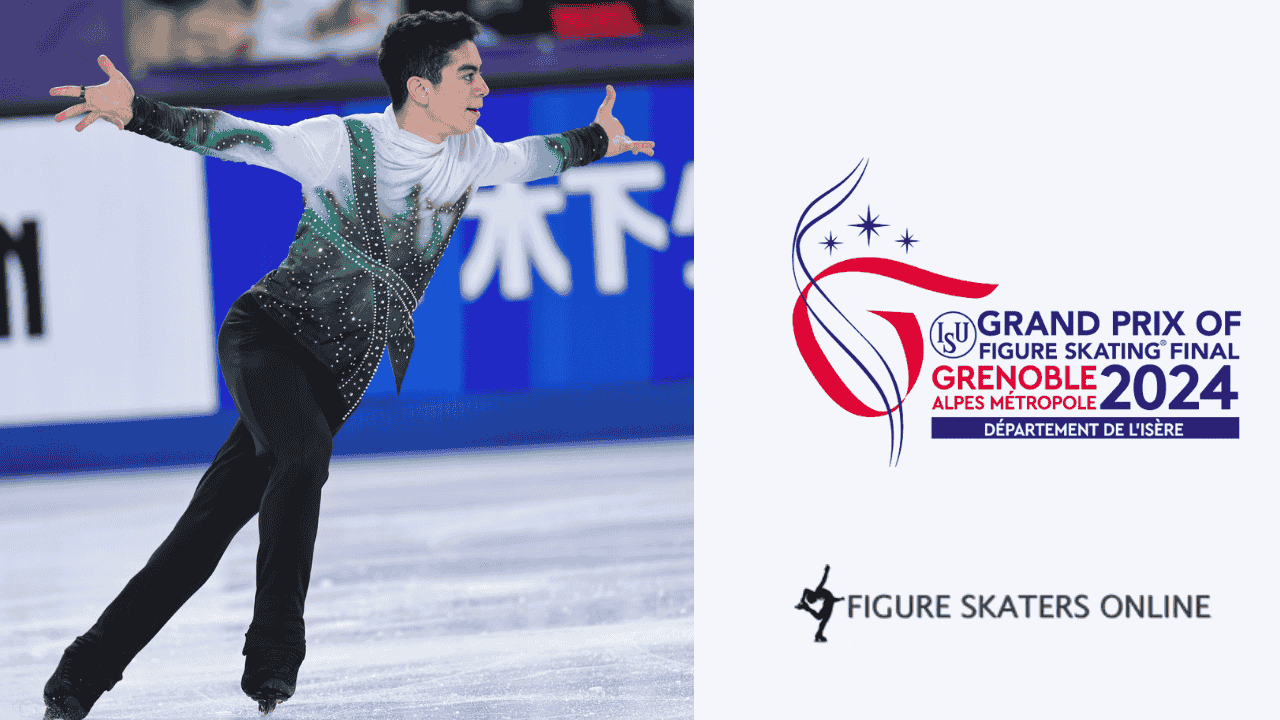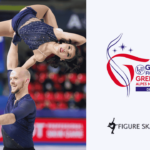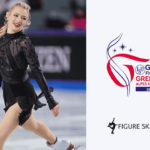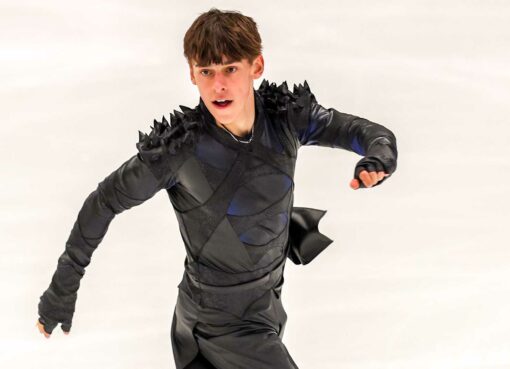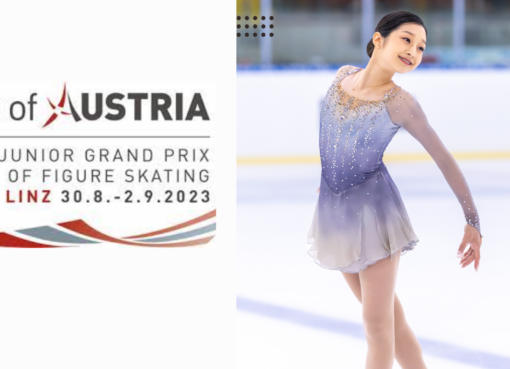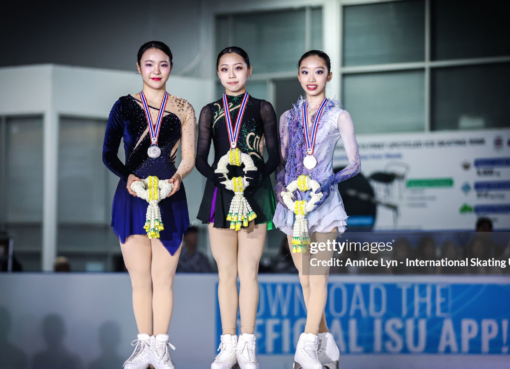Grenoble, France — The 2024 ISU Junior Grand Prix Final was held in Grenoble, France Dec. 5-7. The event concluded the seven Junior Grand Prix Series events that took place from August-October.
Here’s a recap of the event.
Men
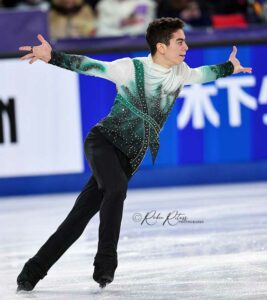 Team USA’s Jacob Sanchez first made his debut on the Junior Grand Prix in 2021, but it wasn’t until this season that he stood on the podium and secured a ISU Junior Grand Prix medal. That medal would be gold. He would take another JGP gold medal and qualify for his Junior Grand Prix Final. At the Final in Grenoble, Sanchez claimed his third JGP medal and became the first U.S. man to win the Junior Grand Prix title since 2017 when Alex Krasnozhon won gold. He also is the first U.S. skater of Hispanic descent to win gold at the Junior Grand Prix Final.
Team USA’s Jacob Sanchez first made his debut on the Junior Grand Prix in 2021, but it wasn’t until this season that he stood on the podium and secured a ISU Junior Grand Prix medal. That medal would be gold. He would take another JGP gold medal and qualify for his Junior Grand Prix Final. At the Final in Grenoble, Sanchez claimed his third JGP medal and became the first U.S. man to win the Junior Grand Prix title since 2017 when Alex Krasnozhon won gold. He also is the first U.S. skater of Hispanic descent to win gold at the Junior Grand Prix Final.
In second after the short program by 0.15 points, Sanchez’s “lo Ci Saro” free skate included six clean triple jumps, including a triple flip-triple toe combination and a triple Lutz-double Axel-double Axel sequence. His only mistake was he stepped out of his opening triple Axel. Sanchez earned a free skate score of 148.14, which was second in the free skate, but he pulled up to finish first overall with a score of 227.38.
“This feels pretty crazy. I definitely was not expecting this outcome at this event. I really didn’t know that I was going to make it this season here, because my first Grand Prix was the only assigned one. But I was able to do really well on my first one in Ankara and that gave me another opportunity to qualify, and I ended up doing pretty well in Slovenia. I did not expect to win, and I think that everybody here did well and it was amazing to share the venue with amazing skaters and all these juniors and seniors. It’s such an inspiring atmosphere and it’s something that I think we all should appreciate, and I really appreciate this whole week that I’ve had with all of them,” he said. 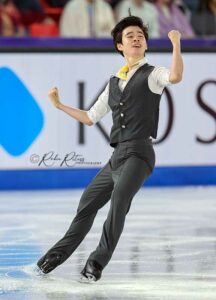
Korea’s Minkyu Seo, who was also competing in his first Junior Grand Prix Final, was in fifth place after the short program. In his Singing in the Rain, Seo opened the program with a triple Axel-triple toe combination and then went on to complete six more clean triples. He won the free skate with a season’s best score of 152.46. He jumped up to second place with an overall score of 222.14.
“I did several mistakes yesterday, and today I tried to cover it up and make a clean program,” Seo said following his skate. “I think I did it and I’m very satisfied with my free program today. I’ll be continuing working hard on skating clean and showing good performances to the audience.”
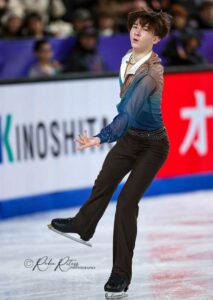 The leader after the short program was Japan’s Rio Nakata, last year’s Junior Grand Prix Final gold medalist. In his Pirates of the Caribbean free skate, Nakata landed the only quadruple jump attempted in the junior men’s short program, but then he popped his triple Axel as well as a triple loop later in the program. He earned a free skate score of 135.94, which was fourth in the free skate. He dropped from first to take the bronze medal with a score of 215.33.
The leader after the short program was Japan’s Rio Nakata, last year’s Junior Grand Prix Final gold medalist. In his Pirates of the Caribbean free skate, Nakata landed the only quadruple jump attempted in the junior men’s short program, but then he popped his triple Axel as well as a triple loop later in the program. He earned a free skate score of 135.94, which was fourth in the free skate. He dropped from first to take the bronze medal with a score of 215.33.
“During my training, I was able to land my jumps properly and I was first for the short program, but when I learned the other skaters’ scores, I felt a lot of pressure,” Nakata admitted.
“Even though I made mistakes, if I had worked harder to do my other jumps better, maybe I could’ve gotten a better score,” he added.
Japan’s Sena Takahashi moved up from sixth to fourth with an overall score of 204.40. Yanhao Li, who was the first skater from New Zealand to qualify for an ISU Grand Prix Final finished fifth (203.63). Slovakia’s Lukas Vaclavik, who was in third after the short program dropped to sixth overall (176.36). His right skate blade broke during the morning practice and he had to switch to a new blade.
Women
 Since the 2021-2022 season, Mao Shimada has won every junior-level competition that she has competed in, and in Grenoble, France Dec. 6, the two-time ISU World Junior Champion added another win to her resume, winning her third Junior Grand Prix Final title, and also was one-third of the first-ever Japanese podium sweep in the ISU Junior Grand Prix Final.
Since the 2021-2022 season, Mao Shimada has won every junior-level competition that she has competed in, and in Grenoble, France Dec. 6, the two-time ISU World Junior Champion added another win to her resume, winning her third Junior Grand Prix Final title, and also was one-third of the first-ever Japanese podium sweep in the ISU Junior Grand Prix Final.
Shimada had an almost six-point lead heading into the free skate. In her “Mado Kara Mieru” free skate, the 16-year-old attempted a triple Axel, which was under-rotated and also fell on her quadruple toe attempt, which was also downgraded. Shimada also fell on a triple loop. Despite the mistakes, she landed six clean triples and won the free skate with a score of 125.74 and a total score of 199.46 to take the title.
“I am very happy to be part of that historical sweep today and am happy today we were able to prove that the junior field in Japan is very deep indeed,” Shimada said.
“In my performance today, I made many mistakes that were very disappointing to me,” she added. “I will have to reflect on that going forward but what I was able to achieve is a growth from last year. Last year, I let the mistakes I made affect my mind but this time I was able to overcome it and not repeat the mistakes I made in the previous event.”
Sitting in second place after the short program was Japan’s Kaoruko Wada, who was competing in her first Junior Grand Prix season. In her Titanic free skate, she opened with a double Axel and a triple Lutz-triple toe combination. She had a two jumps called on the quarter, and a triple Lutz called under-rotated. She earned a free skate score of 123.98 and a total score of 191.75 to claim the silver medal.
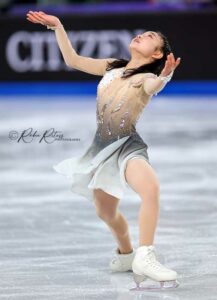 “There were several under-rotations on my jumps so it’s something I will have to reflect upon and hope to improve for the next events,” Wada said following her skate. “The good things to take away, although I was a bit nervous, I was still able to enjoy and skate freely and it’s something I’m very proud of.”
“There were several under-rotations on my jumps so it’s something I will have to reflect upon and hope to improve for the next events,” Wada said following her skate. “The good things to take away, although I was a bit nervous, I was still able to enjoy and skate freely and it’s something I’m very proud of.”
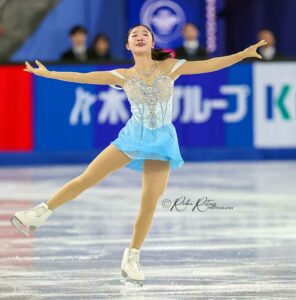 Japan’s Ami Nakai, who was in third after the short program, was competing at the Junior Grand Prix Final for the third time. She opened her “Cinderella” program with a triple Axel-triple toe combination, but her triple Axel was called under-rotated. She also had an almost clean triple Lutz-Euler-triple Salchow combination, but the triple Salchow was called on the quarter. She did manage to complete four clean triples. She ranked fourth in the free skate with a free skate score of 122.32, but held on to third place with 189.58 points to claim the bronze medal, her first Junior Grand Prix Final medal.
Japan’s Ami Nakai, who was in third after the short program, was competing at the Junior Grand Prix Final for the third time. She opened her “Cinderella” program with a triple Axel-triple toe combination, but her triple Axel was called under-rotated. She also had an almost clean triple Lutz-Euler-triple Salchow combination, but the triple Salchow was called on the quarter. She did manage to complete four clean triples. She ranked fourth in the free skate with a free skate score of 122.32, but held on to third place with 189.58 points to claim the bronze medal, her first Junior Grand Prix Final medal.
“This is my first podium in the Junior Final and I’m glad to be on the podium with the other two Japanese skaters here and this was a great experience for me,” Nakai shared. “I’m very proud I was able to land the triple Axel on this big competition. It was a bit under-rotated, however I made it and I’m proud of it. The remaining jumps I was able to pull together so the performance overall went pretty well.”
China’s Yihan Wang placed third in the free skate and was fourth overall with a total score of 187.90. Korea’s Yuseong Kim also landed a triple Axel and finished fifth with 184.23 points. France’s Stefania Gladki came in sixth with 175.39 points.
Pairs
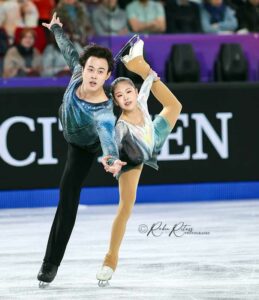 The last time a Chinese pair claimed an ISU Junior Grand Prix title in pairs was 2013 with the team of Xiaoyu Yu and Yang Jin. Now eleven years later, China is back on top of the Junior Grand Prix Final podium in the pairs discipline as Jiaxuan Zhang and Yihang Huang claimed the gold medal.
The last time a Chinese pair claimed an ISU Junior Grand Prix title in pairs was 2013 with the team of Xiaoyu Yu and Yang Jin. Now eleven years later, China is back on top of the Junior Grand Prix Final podium in the pairs discipline as Jiaxuan Zhang and Yihang Huang claimed the gold medal.
In first after the short program by seven points, Zhang and Huang opened their “All for One” by Hael free skate with a triple twist and side-by-side triple toe-Axel-double Axel sequence, which was called on the quarter. They also produced side-by-side triple Salchows and a throw triple loop, which Zhang stepped out on it.They earned a personal best free skate score of 113.15 and a total score of 176.09, which was also a personal best score to win the title by 21 points. This is the team’s first season together.
“I feel very good. I feel very honored to be at this final and we want to keep up the good work in the future. This audience is very enthusiastic and they cheered a lot for us,” Zhang said.
“First of all, I’m very proud to represent China in this event and then to come here to participate in this competition,” Huang added.
Reigning World Junior silver medalists Olivia Flores and Luke Wang of the U.S., who were third after the short program, moved up to claim the silver medal.
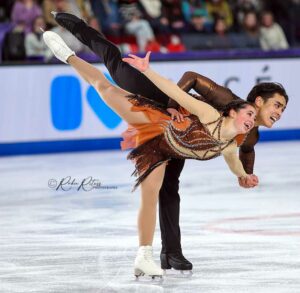 Their The Lion King free skate featured a triple twist, side-by-side triple Salchows and throw triple loop. The 2024 ISU World Junior silver medalists improved their season’s best by 11 points with a free skate score of 103.78 and a total score of 155.82. The team improved on their fifth place finish at last year’s Final.
Their The Lion King free skate featured a triple twist, side-by-side triple Salchows and throw triple loop. The 2024 ISU World Junior silver medalists improved their season’s best by 11 points with a free skate score of 103.78 and a total score of 155.82. The team improved on their fifth place finish at last year’s Final.
“I came into the competition honestly really nervous, I had some butterflies in my stomach. It was so much fun to be out there and to perform that program with Luke. We both love it so much,” Flores said.
“It [the medal] means so much especially because we came here last year and we had hopes to medal last year, too,” she aded.
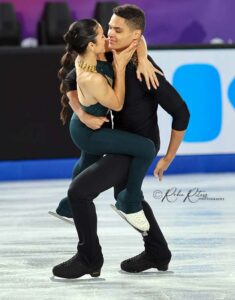 Canada’s Jazmine Desrochers and Kieran Thrasher, who claimed the bronze medal at the Junior Grand Prix Final last season, added another JGP Final bronze medal. In their “Since I’ve Been Loving You” free skate, Desrochers fell on both throw jumps and the team struggled with their side-by-side triple Salchows. They scored 97.54 in the free skate and dropped from second after the short program to third overall with a score of 152.82.
Canada’s Jazmine Desrochers and Kieran Thrasher, who claimed the bronze medal at the Junior Grand Prix Final last season, added another JGP Final bronze medal. In their “Since I’ve Been Loving You” free skate, Desrochers fell on both throw jumps and the team struggled with their side-by-side triple Salchows. They scored 97.54 in the free skate and dropped from second after the short program to third overall with a score of 152.82.
“We showed some good quality elements and some elements we could have performed better. Overall, it was still a good competition for us,” Thrasher said.
France’s Romane Telemaque and Lucas Coulon finished fourth with a score of 146.38. Japan’s Shae Shimizu and Lucas Tsuyoshi Honda ranked fifth with 145.66 points followed by Julia Quattrocchi and Simon Demarais, of Canada, in sixth place with 139.13 points.
Dance
Italy’s Noemi Maria Tali and Noah Lafonara brought home the first Junior Grand Prix Final gold medal in ice dance for Italy in 27 years. Team USA’s Katarina Wolfkostin and Dimitry Tsarevski earned the silver medal while Darya Grimm and Mikhail Savitskiy of Germany repeated as Junior Grand Prix Final bronze medalists.
Read more about the junior ice dance event at Ice-Dance.com.


